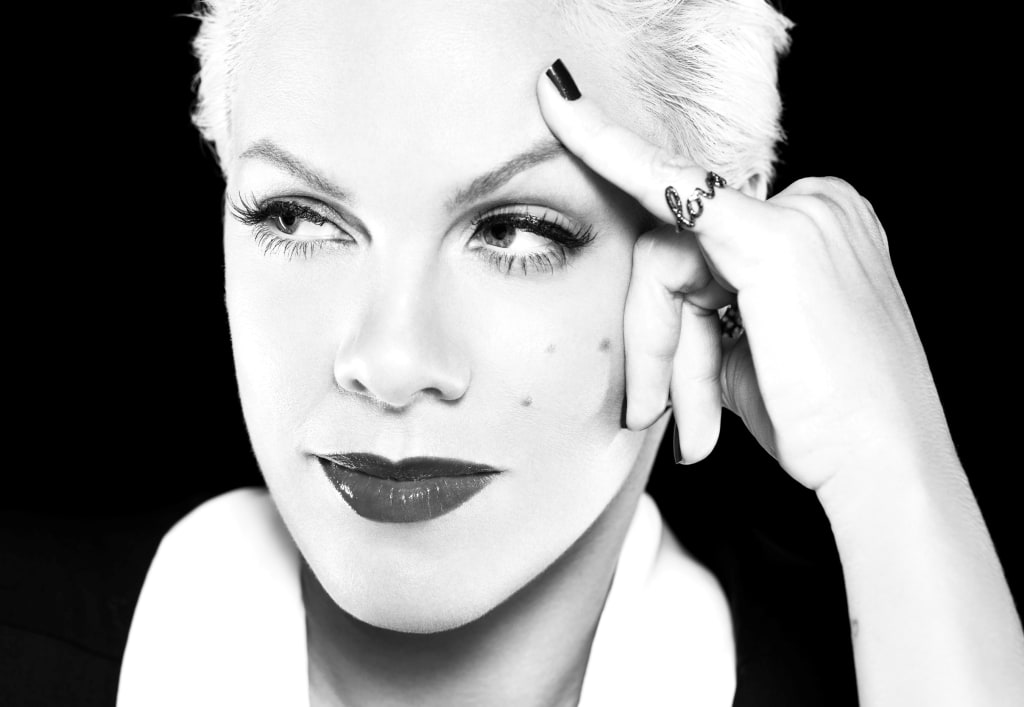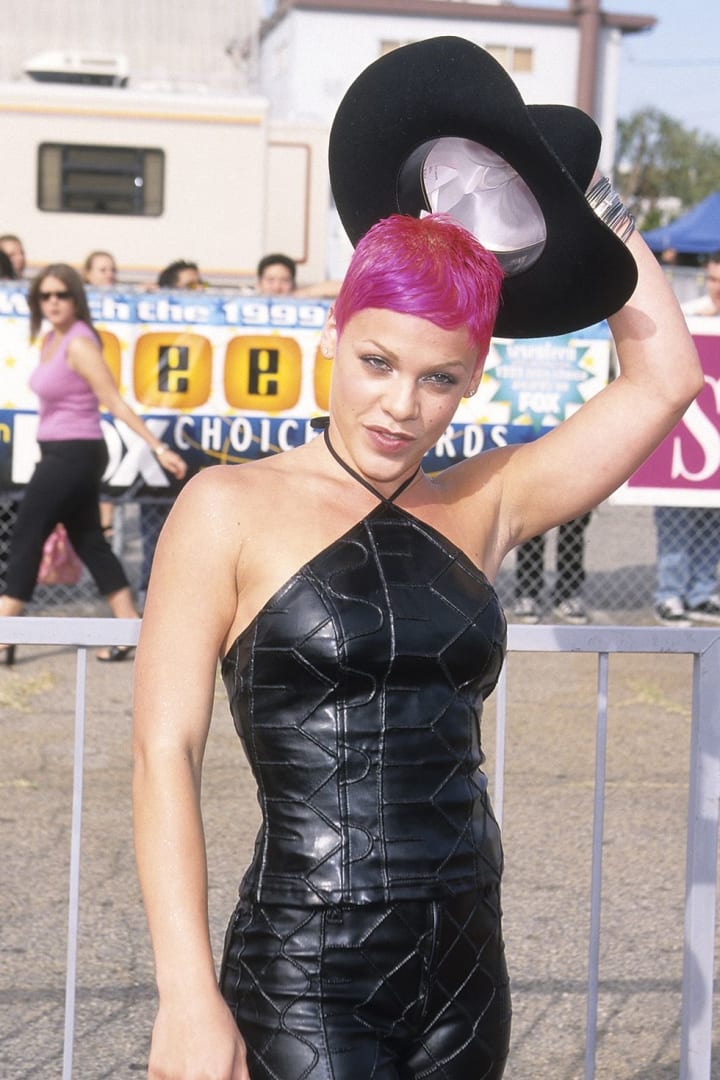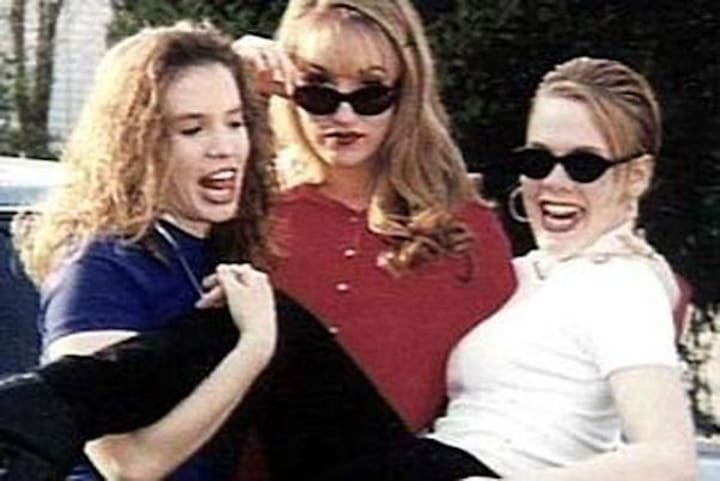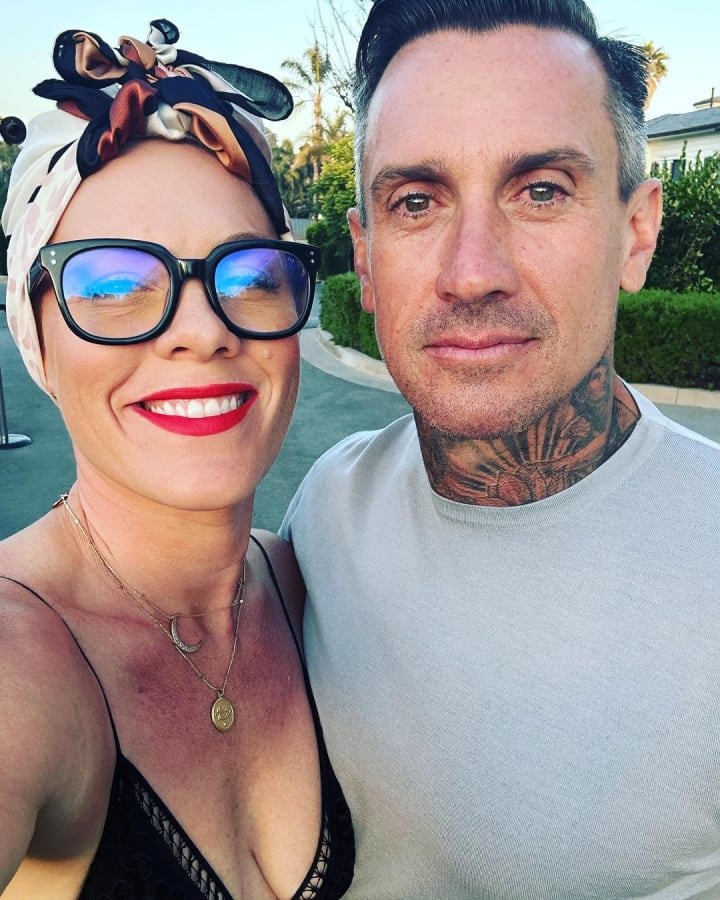Where'd You Go? The De-Blackening of P!nk
The pop singer is now one of the biggest stars in the world - but why does she continue to ignore her R&B past?

During the final months of 2023, a long-lost holy grail of millennial music history was finally unearthed and shared with the masses.
The discovery, Choices, was the 1998 shelved debut album of former R&B trio, Choice. If you’ve never heard of them, don’t fret – many haven’t. For a time, they were solely known as the singers behind a schmaltzy R&B ballad, “Key to My Heart,” which was tacked on to the soundtrack of Kazaam, the 1996 kids’ movie (yes, the one with Shaq as a genie).
While the film went on to become the thing memes - or possibly, the Mandela effect - are made of, the soundtrack fared a bit better thanks to the involvement of several big acts in 90s music. Performers Nathan Morris of Boyz II Men, Lisa “Left-Eye” Lopes of TLC, and Spinderella of Salt-n-Pepa fame all appear on the soundtrack.
Choice was one of the few up-and-comers among the various artists, but they had a major industry player in their corner: Legendary record producer Antonio “L.A.” Reid.
Reid first saw potential with the group after hearing an early demo of “Key to My Heart.” He would sign the three young Pennsylvania natives; Sharon Flanagan, Chrissy Conway, and Alecia Beth Moore, to a deal with LaFace Records in 1996.
From the start, Reid honed in on the factor he felt would make Choice stand out, and it was rather obvious.
“The concept [of Choice] was white girls singing Black R&B music,” claimed Judith Moore, Alecia’s mother, on an episode of VH1’s Driven in 2003.
The girls set out to work on their first album some time in 1998. While recording, another factor became crystal clear to Reid – out of the three young singers, Moore was the standout.
The legend goes that Reid pulled Moore aside during a 1998 holiday party for LaFace artists and gave her an ultimatum: “Go solo or go home.”
Moore chose the former and Choice would go their separate ways. She would then begin working on her debut, recording new songs and re-recording a few cuts from the now-shelved Choice album as solo tracks. At some point following, she would rebrand herself with a new look and a new stage name: Pink (usually stylized as “P!nk”).
Pink’s first album, Can’t Take Me Home, was released in April 2000. Right out of the gate, Moore and Reid hit a home run with the LP’s first offering, a bouncy kiss-off track called, “There You Go.”
Co-written by Moore, Kevin “She’kspere” Briggs; the man behind TLC’s “No Scrubs,” and singer-songwriter (and eventual Atlanta Housewife) Kandi Burruss, “There You Go” would ultimately become Pink’s first top 10 Billboard hit. It was also a hell of an earworm with music fans – specifically, Black music fans.
“There you go/Talkin’ ‘bout you want me back,” Pink sings in the chorus of “There You Go” with flair, “but sometimes, it be’s like that.”
Except, Moore wasn’t Black - not even a little bit. But most people didn’t know that just yet.
The ruse was pushed further with the music video for “There You Go.” In the clip, Pink is decked out in loose silk pajamas - a clear reference to TLC’s CrazySexyCool period - and lusts after racially ambiguous men while rocking makeup and a hairstyle that definitely gives what some Black folks refer to as “high yellow.”
From a visual standpoint, Pink looked and sounded every bit of the Black girl Reid and LaFace wanted us to believe she was. Even a short vignette where Pink tells off a former lover in the video includes some remote vernacular aspect of Blackness (“I thought I told you not to call! Is that bitch still with you?”)
As “There You Go” and Pink started picking up steam, the media would address the elephant in the room without actually realizing what they were doing.
“Why do you call yourself 'Pink'?”
“Because we’re all pink on the inside,” the young singer would respond with a knowing smirk.
Two more singles from Can’t Take Me Home; R&B bangers “Most Girls” and “You Make Me Sick,” would close out the era. The now-legendary “Lady Marmalade” remake with Missy Elliott, Mya, Lil Kim, and Christina Aguilera followed in 2001, along with appearances on the 6th annual Soul Train Lady of Soul Awards and MTV’s Icon: Janet Jackson special.

Somehow, Pink had been deemed Black (or Black-adjacent) enough to maneuver in these and other Black spaces without so much as anyone blinking or even giving her a side-eye.
That was until late 2001, when it was announced that her second album, titled Missundaztood (pronounced “misunderstood”), was on its way – and with it, a very different Pink than most were familiar with.
Gone was the racially ambiguous light-skinned woman with brightly colored hip-hop-influenced fashion choices, flat-ironed hot pink hair, and whatever accounted as swag back in the early aughts.
In her place, for lack of better phrasing, was a straight-up white girl – now rocking a mix of bohemian chic and skater couture, a blond bob with pink streaks (or sometimes with long multicolored dreads), topped with a “devil’s horn” pose during occasional public appearances.
She did retain some of her borrowed Blackness, such as with the phonetic spelling of “misunderstood” (which has a clear AAVE influence), and the first offering from the album, the pop-heavy yet hip-hop-inspired, “Get the Party Started.”
It was with its music video that the world got their second first impression of Pink - now with extra whiteness!
In the clip, Pink is first seen stepping out of the shower with most of the color seemingly washed out of her hair (symbolism!). She then goes through several outfit changes – including some cliched “urban” looks featuring oversized gold jewelry and a gold tooth cap – before settling on an outfit that screams “cool club kid on a budget.”
After linking with her one Black friend, she heads off to Club (no, the venue is literally called “Club”) in a 70s-style hooptie that quickly breaks down and forces her to travel the rest of the way via skateboard. Her skills catch the attention of three young men driving in another car; all white or white-adjacent - even the one with braids - but her attempt to flirt back causes her to lose her cool and crash into the pavement – just like a ditzy white girl.
Pink and her Black friend eventually arrive at Club and bypass the crowd via a building scaffold. Once inside, Pink spins into another stereotypically urban outfit with gold jewelry (while the Black friend’s clothes never change). After this, she heads to the dance floor to join a Save the Last Dance-style choreographed breakdown with several backup dancers, including a young Kevin Federline (yes, that Kevin Federline).
Just how white could a white girl be if the white girl once played Black?
Pink would attempt to explain her new direction in several interviews leading up to and during the Missundaztood promotional period. They were mostly different takes on the same reasoning.
“I don’t like having to fall into this sick category of music today,” she told the National Post in December 2001, “which is just gimmicky, candy-coated pop. [Can’t Take Me Home was] a good introduction to me, but there was a lot of compromise.”
She would expand on this feeling in one of Missundaztood’s biggest hits, the melancholic “Don’t Let Me Get Me.”
“L.A. [Reid] told me, ‘you’ll be a pop star,’” she laments in melody. “All you have to change is everything you are.”
And change, she did.
Since then, Pink has released seven more studio albums. With each offering, she steers further away from the sound of Can’t Take Me Home. Her most recent effort, 2023’s Trustfall, is, by far, the most removed she’s ever been from her beginnings as the “pop star” she never wanted to be – although that’s kind of exactly what she is now.
There are little to no R&B influences on Trustfall, save for some disco moments on the first single, “Never Gonna Not Dance Again.” There also are not as many Black songwriters or producers involved with the project (my attempt to Google came up with one who may be Black, but I’m mostly unsure. Feel free to correct me in the comments).
It was also her first album not to reach the top spot of the Billboard Top 200 since 2008’s Funhouse, an album not too sonically dissimilar from Trustfall. The biggest difference is that there appears to be some Black artists, songwriters, and producers mentioned throughout the credits of Funhouse.

Now clearly, no one is alluding to or even outright stating that the now 44-year-old entertainer has racist beliefs or preferences, or has ever said or done something with steadfast racist intent. Those, like yours truly, who have followed her career for nearly 30 years know that Pink has never been that kind of girl. She has long proven herself as a true ally to women and those in marginalized communities; including but not limited to Black, Brown, and queer folks.
However, that doesn’t mean she’s fuckin’ perfect – far from it.
Fans of Pink’s Can’t Take Me Home celebrated the album’s 24th anniversary earlier this April. Despite the problematic tactics used to get Black people to gain interest in the singer and, by association, purchase the album, music listeners still hold the era and early Pink in high regard. In some social media circles, Black millennials warmly reminisce about their introduction to Pink and her music. Most refer to her during that time as “the OG Black Pink,” or, on occasion, “P!gga” (I’ll let you all figure out where that last one is an amalgamation of).
Beginning with the tour run for Missundaztood, Pink began to pay little to no mind to songs from the Can’t Take Me Home era. According to Wikipedia, she last performed a three-song medley of cuts from the album during her The Truth About Love Tour in 2013. The three tours that have followed – the Beautiful Trauma Tour, Summer Carnival, and the Trustfall Tour –do not include songs from Can’t Take Me Home on their set lists.
Additionally, the American deluxe version of her 2010 Greatest Hits… So Far! album excludes most of the Can’t Take Me Home era save for its first single, “There You Go” (an accompanying DVD includes all three music videos from the album).
The omission seems odd as “Most Girls,” the second single from Can’t Take Me Home, was another American top 10 hit for Pink (it peaked at no. 4 on the Billboard Hot 100). “You Make Me Sick,” the third and final single, barely cracked the top 40, but its video did receive heavy airplay on VH1 and MTV. Yet, it is also somehow missing from the album tracklist.

While nothing is unusual about an almost 30-year-long recording artist occasionally failing to give attention to past eras, it is disparaging how Pink continues to separate herself from her R&B beginnings. It is also not lost on me as a Black man to see how she denotes that period of her career as meaningless “pop.”
Let me make this clear. None of the songs on the Can’t Take Me Home album are pop. They may have been hits on pop radio that ranked high on the pop charts, but they are not pop songs.
They were meticulously chosen by the Black head of an R&B record label and crafted by Black R&B songwriters and producers as R&B songs. They were never pop songs.
Pink got her start as a member of an R&B group. Her first solo album is straight R&B, through and through. R&B music is, predominantly, known and revered as a Black genre. To continue to ignore what got her foot in the door and the audience she used to get to where she wanted to be is extremely disheartening. She may not be the first white artist or entertainer to pull a similar feat for the level of fame she deemed worthy enough of chasing, but her actions disappoint me the most.

Unlike someone like Miley Cyrus who twerked her way into Black spaces for a bit of “edge” (which she, thankfully, has acknowledged and apologized for in the past), Pink is someone who built the foundation of her career within those same spaces, then used Black music listeners to pivot away from it.
Despite attempts to be someone she wasn’t at the start of her career (even if the practice came from higher-ups), we eventually figured out who she genuinely was – and we still allowed her to hang with us.
For crying out loud, we allowed her to take the stage at the Soul Train Lady of Soul Awards and also dance for Janet Jackson. I don’t think we even let icons like Teena Marie do things similar to what Pink was doing at the start of her career (rest in power, Lady T).
All jokes aside, I don’t think it’s asking for much of Ms. Moore to properly acknowledge and appreciate this time in her career. It may not have been the best representation of who she is as an artist, but that time still brought her a multitude of Black attention before everyone else caught on to her talent.
The surprise leak of the shelved Choice album in 2023 was a nice reminder of who Black audiences accepted with open arms in 1998 – but it’s not enough, especially as it wasn’t an official move on Pink's part. It also isn’t lost on me that she’s never acknowledged the leak or has even mentioned Choice by name in some time.
It may have taken an album or two (or nine) to get to this point, but we now know who you are, Pink. The question is, why are you out here acting like you don’t know us or where you came from? Stop it, Alecia - be's better.
About the Creator
Jonathan Apollo
I bang my keyboard and words come out. Sometimes, they're worth reading. Sometimes, they're even good.
40-something, M, NYC. He/Him/His. #TPWK
https://twitter.com/JonnyAWrites
http://www.facebook.com/JonnyAWrites






Comments
There are no comments for this story
Be the first to respond and start the conversation.